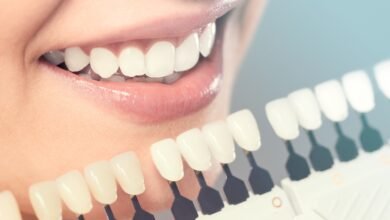Is Gum Disease Curable? You Bet! Here’s

Is gum disease curable? A lot of people worry that it’s not, but this couldn’t be further from the truth! Some simple treatments help to reverse and prevent the progression of gum disease. Keep reading to learn how you can keep your gums healthy and strong, so you don’t have to deal with the serious consequences (i.e., tooth loss) down the road.
What Is Gum Disease (Periodontitis)?
Gum disease is an infection of the gums that can damage the soft tissue and bone that support your teeth. Periodontitis, or gum disease, is caused by plaque, a sticky film of bacteria that forms on your teeth. Plaque begins to form on your teeth soon after you eat. If not removed, it turns into tartar (calculus), which is harder to remove. The best way to remove plaque is to brush and floss your teeth every day. But if you don’t do this consistently, bacteria will build up and cause gum disease.
The best cosmetic dentists near me can take care of most cases with these methods: Cleaning off the tartar from around your teeth with a dental scaler, ultrasonic scaling and root planing for deep pockets around the tooth roots, laser therapy to kill periodontal pathogens in between teeth, surgical treatment when necessary (which might include tooth extraction) – all under anesthesia so there’s no pain during treatment.
Symptoms Of Gum Disease
Do your gums bleed when you brush or floss? This could be a sign of gum disease, which is caused by a build-up of plaque on your teeth. If left untreated, gum disease can lead to tooth loss. Other symptoms include red, swollen, or tender gums; persistent bad breath; and a change in the fit of your teeth. If you’re experiencing any of these symptoms, be sure to see a dentist right away. And if you’re looking for the best cosmetic dentists near you, look no further than our state-of-the-art dental practice. We’ll help you get your smile back in no time!
Types Of Treatment For Gum Disease
Treating gum disease can be as simple as improving your oral hygiene habits. If your gum disease is more advanced, however, you may need to see a dentist for a cleaning and scaling of your teeth. In severe cases, surgery may be necessary to remove diseased tissue and promote healthy growth. Your best bet is to see one of the best cosmetic dentists near you to discuss your treatment options. They will examine your mouth and recommend the best course of action based on what they find. They’ll also work with you to create a customized treatment plan that fits your needs and budget.
The American Dental Association’s Recommendations For Treating Periodontal Diseases
The American Dental Association (ADA) recommends that people with periodontal disease see a dentist or other dental professional at least twice a year for preventive care and more often if they have an active disease. They also recommend that people brush their teeth twice a day, floss daily, eat a balanced diet, and visit their dentist regularly.
The best way to prevent gum disease is to practice good oral hygiene. This means brushing your teeth twice a day, flossing daily, and visiting your dentist regularly. Eating a balanced diet and quitting smoking are also important for preventing gum disease.
If you already have gum disease, there are treatments available to help control it. These include professional cleanings, scaling and root planing (a deep cleaning), antibiotics, and surgery.
Prevention Tips For Maintaining Healthy Gums
1. Visit your dentist regularly for professional cleanings and checkups.
2. Brush your teeth twice a day, using a soft-bristled toothbrush and fluoride toothpaste.
3. Floss daily to remove plaque from between your teeth and beneath your gumline.
4. Eat a balanced diet and limit sugary snacks and drinks.
5. Quit smoking or using tobacco products.
6. Manage stress to promote overall good health.
7. Use an antibacterial mouthwash to help reduce plaque and prevent gum disease.
8. Keep up with oral hygiene procedures if you have diabetes or other conditions that increase the risk of developing gum disease.
9. See your dentist as soon as possible if you experience any symptoms of periodontal (gum) problems such as swollen gums, tenderness in the gums, persistent bad breath (halitosis), loose teeth, pain when chewing foods, and excessive bleeding when brushing and flossing.



